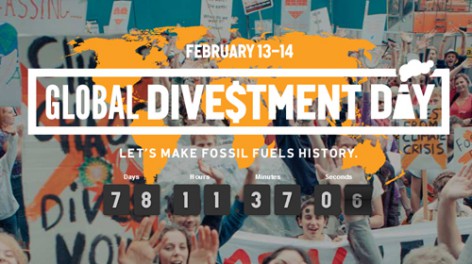
http://oxfordunifossilfree.wordpress.com/updates-and-news/
FOR IMMEDIATE RELEASE 11/11/14
Oxford, UK – 100 Oxford academics [1], nearly 300 alumni [2] and over 2000 students [3] have signed an open letter urging the University of Oxford to move towards divesting its £3.8bn endowment from fossil fuels. 27 college common-rooms representing over 8200 students and Oxford University Student Union (OUSU) have also backed the OUSU Environment & Ethics Fossil Free campaign [4].
Oxford students celebrated this huge boost in support for divestment by touring Oxford colleges and landmark. This has come after the University extended a consultation [5] on fossil fuel divestment, due to end this week (November 14th).
The Fossil Free campaign submitted a report [6] to this consultation detailing its recommendations for the University, including a call to cut all direct investments in coal and tar sands oil and also to establish clear targets to move its indirect investments away from carbon-intensive assets and into low-carbon alternatives, including renewable energy.
Supporters of the student Fossil Free campaign include academics such as Lord Professor Robert May (ex-Chief Scientific Advisor to the Government), Emeritus Professor of International Relations Avi Shlaim and Professor Gordon Clark (Director of the Smith School and Fellow of the British Academy). High-profile alumni such as George Monbiot, Kumi Naidoo, Polly Toynbee and Ken Loach have also given their support.
….
Professor J. Doyne Farmer, Co-Director of Complexity Economics at the Institute for New Economic Thinking at the Oxford Martin School
“Science makes it clear that use of fossil fuels needs to stop as soon as possible. It is technologically feasible to replace fossil fuels in a short time if we only resolve to do so. Oxford University should show leadership by divesting from fossil fuel companies and supporting alternatives, and encouraging others to follow.”
CONTACT:
Interviews and photos available from: Ellen Gibson (OUSU Environment & Ethics Chair) on eande.chair
NOTES TO EDITORS:
- The academics open letter and list of signatories can be found here.
- The alumni open letter can be found here.
- The general petition with over 2000 signatures can be found here.
- The list of other supporters, as well as information about the student campaign can be found here.
- http://www.admin.ox.ac.uk/councilsec/governance/committees/srirc/.
- Report available here: http://oxfordunifossilfree.wordpress.com/about/our-report-averting-a-climate-crisis/.
- http://gofossilfree.org/press-release/rapid-increase-in-institutions-pulling-money-out-of-fossil-fuels/.
Global Climate Change
Environment Ethics
Environment Justice






